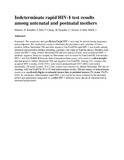Indeterminate rapid HIV-1 test results among antenatal and postnatal mothers
Date
2008Author
Matemo, D
Kinuthia, J
John, F
Chung, M
Farquhar, C
Stewart, G John
Kiarie, J
Type
ArticleLanguage
enMetadata
Show full item recordAbstract
Summary: The sensitivity and specificity of rapid HIV-1 tests may be altered during pregnancy and postpartum. We conducted a
study to determine the prevalence and correlates of false-positive Abbott DetermineTM and false-negative Uni-GoldTM rapid HIV-1
test results among antenatal and postnatal mothers attending a primary care clinic in Nairobi, Kenya. Mothers were tested for HIV-1
using Abbott DetermineTM and non-reactive results were considered HIV-1 antibody negative. Reactive samples by Determine were
re-tested by Uni-GoldTM. Vironostika HIV-1 and Uni-FORM II Enzyme-linked immunosorbent assays were used to confirm samples
that had positive Abbott DetermineTM and negative Uni-GoldTM. Among 2311 women who accepted HIV-1 testing, 1238 (54%) were
tested antenatallyand 1073 (46%) were tested postnatally. Of tested women, 274 (12%) women were reactive by Abbott DetermineTM
and on retesting with Uni-GoldTM 30 (11%) had indeterminate results. The prevalence of indeterminate results was significantly higher
in antenatal women than in postnatal women (2% versus 1%,P¼ 0.03). In conclusion, indeterminate rapid HIV-1 test results are more
common in the antenatal period and appropriate safeguards to confirm HIV-1 infection status should be implemented in antenatal
programmes.
URI
http://erepository.uonbi.ac.ke:8080/xmlui/handle/123456789/10412http://www.ncbi.nlm.nih.gov/pubmed/19875832
Citation
International Journal of STD & AIDS Volume 20 November 2009Publisher
Department of Obstetric and Gynaecology, University of Nairobi, Kenya
Collections
- Faculty of Health Sciences (FHS) [10378]

